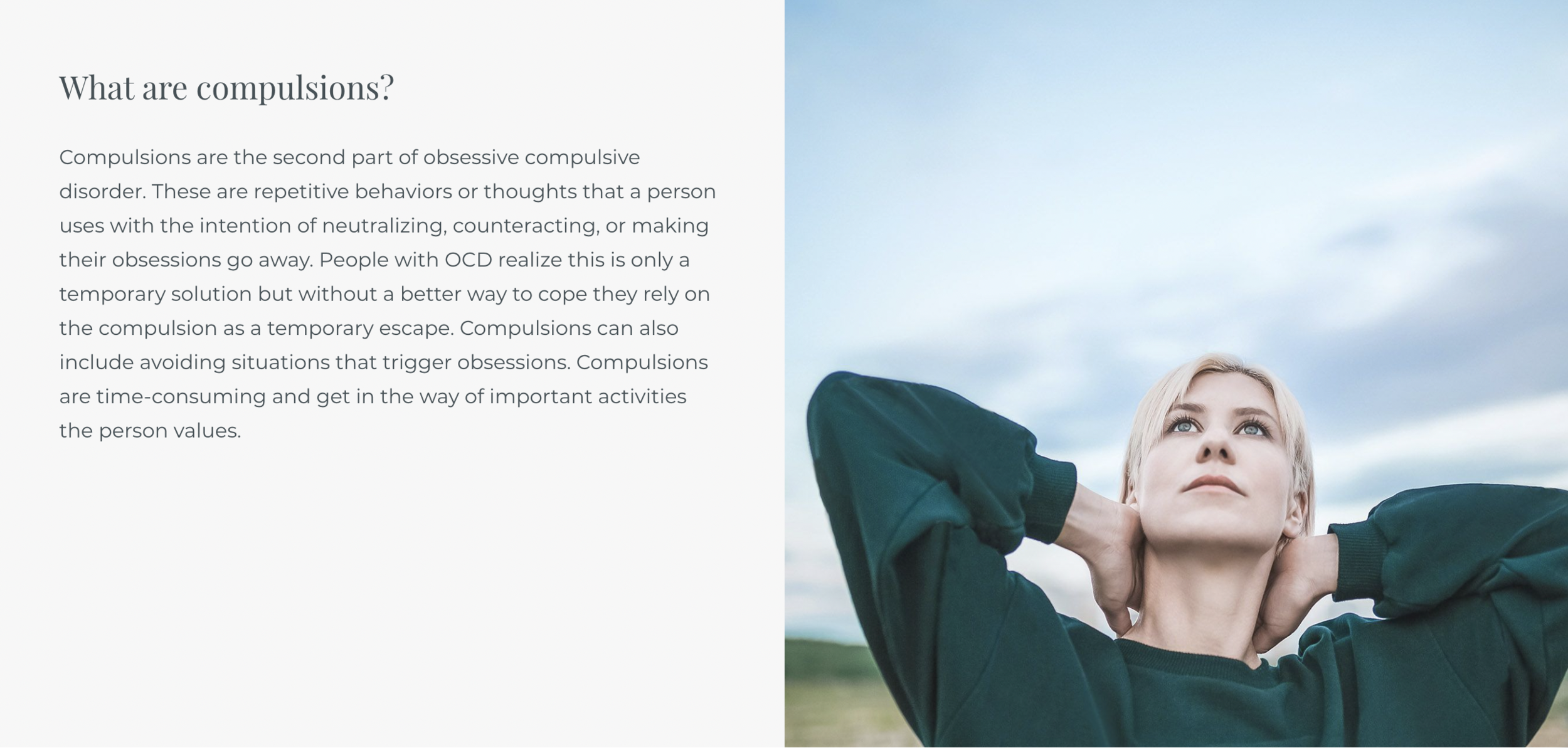
OCD Obsessive Compulsive Disorder Therapy
Understanding Therapy for OCD
Obsessive Compulsive Disorder (OCD) is a condition that affects people of all ages and walks of life, and occurs when a person gets caught in a cycle of obsessions and compulsions. Obsessions are unwanted, intrusive thoughts, images or urges that trigger intensely distressing feelings. Compulsions are behaviors an individual engages in to attempt to get rid of the obsessions and/or decrease his or her distress.
Most people have obsessive thoughts and/or compulsive behaviors at some point in their lives, but that does not mean that we all have “some OCD.” In order for a diagnosis of obsessive compulsive disorder to be made, this cycle of obsessions and compulsions becomes so extreme that it consumes a lot of time and gets in the way of important activities that the person values. This is when therapy for OCD can be helpful.
WHAT ARE OBSESSIONS IN OCD?
WHAT ARE COMPULSIONS IN OCD?
IS OCD TREATABLE?
Absolutely! OCD can be treated by different methods including the use of CBT, aversion therapy, rational emotive behavior therapy, exposure and response prevention, talk therapy and Systematic desensitization. Dr. Kathryn Williams and Dr. Jaclyn Friedenthal use multiple methods to decrease the impact that OCD has on your life and your well being. Line up a free consult today to find out how Thrive Psychology Group can help you overcome and thrive through OCD.
What Is The Best Therapy for OCD?
-

Cognitive-Behavioral Therapy (CBT) for OCD
CBT is widely recognized as a first-line treatment for OCD. It focuses on identifying and challenging irrational thoughts and behaviors associated with OCD. If you're interested in learning more about how CBT can help.
-

Eye Movement Desensitization and Reprocessing (EMDR) for OCD
While EMDR is more commonly associated with trauma therapy, some studies suggest its potential benefit for OCD. To understand how EMDR may be applied to OCD treatment.
-

Acceptance and Commitment Therapy (ACT) for OCD
ACT combines mindfulness strategies with behavioral techniques, promoting acceptance of intrusive thoughts. If you're curious about ACT and its role in managing OCD.
-

Mindfulness-Based Therapies for OCD
Mindfulness practices have shown promise in reducing OCD symptoms. Learn more about incorporating mindfulness into your therapeutic journey, click below.
Can You Do OCD Therapy Online?
Absolutely, online therapy for OCD can be an effective and accessible option for individuals seeking support. The digital landscape has transformed the way mental health services are delivered, making it possible to receive quality care from the comfort of your own space.
-
Assessment and Diagnosis: Online OCD therapy typically begins with an assessment phase where the therapist gathers information about the individual's symptoms, triggers, and overall mental health history. This aids in formulating a personalized treatment plan.
Therapeutic Techniques: Therapists use evidence-based techniques such as Exposure and Response Prevention (ERP), Cognitive Behavioral Therapy (CBT), and Mindfulness in online sessions. These methods are adapted to suit the virtual format, ensuring their effectiveness.
Homework Assignments: Therapists may assign homework exercises and activities to reinforce the strategies discussed during sessions. These assignments are designed to promote consistent progress between sessions.
-
Interactive Communication: Online sessions often involve real-time, face-to-face communication through video calls. This interactive format allows therapists to observe non-verbal cues and build a strong therapeutic alliance.
Privacy and Confidentiality: Confidentiality is a key aspect of online therapy. Platforms used for virtual sessions adhere to strict privacy standards to ensure that personal information remains secure.
Flexibility: Online therapy provides scheduling flexibility, accommodating individuals with busy lifestyles. This flexibility can be especially beneficial for those managing work, education, or family commitments.
-
Virtual Environment: One of the primary distinctions is the virtual environment. Online therapy for OCD allows individuals to connect with licensed therapists through video conferencing platforms, chat, or phone calls. This flexibility can be particularly beneficial for those with OCD who may find it challenging to attend in-person sessions due to specific triggers or anxiety.
Accessibility: Online therapy eliminates geographical barriers, making specialized OCD treatment more accessible to individuals in remote areas or those with mobility constraints.
Comfort and Familiarity: Being in a familiar environment during online sessions can create a sense of comfort for individuals dealing with OCD. This can contribute to a more relaxed and open therapeutic experience.
How to Find an OCD Specialist Online
-
Specialization: Begin by seeking therapists who specialize in OCD treatment. Look for professionals with experience in evidence-based therapies like Exposure and Response Prevention (ERP) and Cognitive Behavioral Therapy (CBT).
Licensing and Credentials: Ensure that the therapist is licensed and holds relevant credentials. A qualified OCD specialist typically has a background in psychology, counseling, or psychiatry. Check their credentials and verify that they are licensed to practice in your jurisdiction.
Experience: Consider the therapist's experience in treating OCD. Ask about their experience with cases similar to yours and the success rates they've achieved. Experience in OCD treatment enhances the therapist's ability to tailor strategies to your specific needs.
-
Treatment Approach: Inquire about the therapist's approach to OCD treatment. Understanding their methodology, including the use of specific techniques like ERP or CBT, will give you insight into their expertise.
Availability: Clarify the therapist's availability and scheduling options. Ensure that their schedule aligns with yours, and discuss the frequency and duration of sessions required for effective treatment.
Homework and Support: Ask about the therapist's expectations regarding homework assignments and the level of support provided between sessions. Consistent engagement with therapeutic exercises is often a key component of successful OCD treatment.
Communication Style: Explore the therapist's communication style and how they foster a collaborative therapeutic relationship. Feeling comfortable with your therapist is crucial for the success of OCD treatment.
-
Educational Background: Verify the therapist's educational background, ensuring they have completed relevant training in the field of mental health. Degrees in psychology, counseling, or psychiatry are common qualifications.
Specialized Training: Look for therapists who have undergone specialized training in OCD treatment. Certifications or additional courses in OCD-specific therapies demonstrate a commitment to staying updated on the latest advancements in the field.
Professional Memberships: Check if the therapist is a member of reputable professional organizations related to mental health, such as the American Psychological Association (APA) or the Anxiety and Depression Association of America (ADAA).
THERAPY FOR OCD FAQs
-
Both Cognitive-Behavioral Therapy (CBT) and Selective Serotonin Reuptake Inhibitors (SSRIs) have shown efficacy in treating OCD. The choice between them often depends on individual preferences, the severity of symptoms, and consultation with a mental health professional. Often, a combination of CBT and medication is considered for comprehensive treatment.
-
Cognitive-Behavioral Therapy (CBT), particularly Exposure and Response Prevention (ERP), is recognized as a highly effective treatment for managing intrusive thoughts in OCD. It involves gradually exposing individuals to feared thoughts and situations while refraining from engaging in compulsive behaviors. Consultation with a mental health professional can help tailor the approach to individual needs.
-
The exact root cause of OCD is not singular and can vary among individuals. It is believed to involve a combination of genetic, neurological, behavioral, cognitive, and environmental factors. Understanding the complex interplay of these elements is crucial for personalized treatment. Consultation with a mental health professional can provide insights into specific contributing factors for an individual.
-
Yes, online therapy has proven to be effective for OCD treatment. It provides accessibility, convenience, and the opportunity to work with qualified therapists specializing in OCD. Online platforms offer various communication channels, including video sessions and messaging, ensuring a structured and supportive therapeutic experience. The effectiveness of online therapy often depends on individual preferences and the severity of symptoms.
Feel free to contact us for more personalized information or to schedule a consultation.







